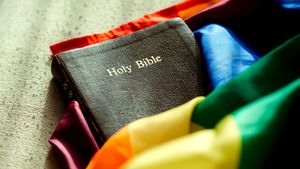In the ongoing
battle between the notoriously antigay Kansas preacher
Fred Phelps and those who wish to stop him from
demonstrating at military funerals, one state this
week banned the practice, and another has advanced a
bill to do the same. Several others are considering similar
legislation that would stop Phelps's clan from picketing the
funerals of soldiers, who Phelps says died as a result
of God's wrath for the acceptance of homosexuality in
America.
On Thursday,
Missouri became the first to enact a law banning the
protests, drawing an immediate pledge of more protests from
Phelps's Kansas church. The bill was signed into law
by senate president pro tem Michael Gibbons, who was
acting as governor because both Gov. Matt Blunt and
Lt. Gov. Peter Kinder are out of the state. The new law bans
picketing and protests "in front of or about" any church,
cemetery, or funeral establishment from one hour before a
funeral until one hour after it ends.
Also on Thursday,
the Kansas state senate voted 40-0 for a bill
restricting protests within 300 feet of any funeral.
The bill goes to the house, where it faces a promising
future. The bill didn't go as far as senators wanted
in restricting Phelps and his followers, but it got
its message across, they said.
During debate,
Kansas senators didn't mention Phelps or his Westboro
Baptist Church by name but acknowledged the bill was
prompted by his activities. "Perhaps the most
vulnerable time in a person's life is when they're
burying a loved one," said Sen. Jean Schodorf. "I
believe we, as Kansans, need to make a statement that we
want people to be able to bury their dead in peace."
During committee
hearings, Stephen McAllister, University of Kansas Law
School professor and constitutional scholar, cautioned that
a 300-foot buffer zone in most instances would extend
to streets and sidewalks, which courts consider public
forum areas. As a result, the bill was reworked to
overcome concerns about encroaching on freedom of speech. It
exempted from the 300-foot buffer zone streets, sidewalks,
and other public spaces. It would keep protesters off
private property, including where the funeral was
being conducted. "I know there are constitutional
problems with taking this farther. I wish it could be
1,000 yards or 1,000 miles," said Sen. David Wysong.
Kansas and
Missouri are among 14 states this year working on
legislation restricting protest activities around
funerals in response to the actions of the Topeka,
Kan., Phelps clan. An Oklahoma bill would
restrict picketing and demonstrations within 500 feet of a
cemetery, church, or home where a funeral or memorial
service is being conducted and prohibits protests
within two hours before or after a funeral service. It
has passed the house and was sent to the senate.
While Missouri
and Kansas were taking legislative action, six members of
the Westboro church were picketing outside the Anoka,
Minn., funeral of a soldier who was killed in Iraq,
but a group of bikers organized to counter the pickets
got in their way. The 20 men and women who gathered
across from the Phelps group are affiliated with the Patriot
Guard Riders, a rapidly growing nationwide movement
organized to counter that very message.
"We're just
trying to show honor and respect for families," said
John Lutsch, a St. Cloud resident who heads the Minnesota
branch of the Patriot Guard. "I was appalled when I
read about these protests, that they'd use a solemn
occasion like this as a forum for their views." He was
interrupted by Steve Drain, who bellowed across the divide
that God hates gays and their enablers and "so,
therefore, God hates the U.S. military."
Minnesota is
among the states currently considering bans on protests at
funerals. (AP)








































































